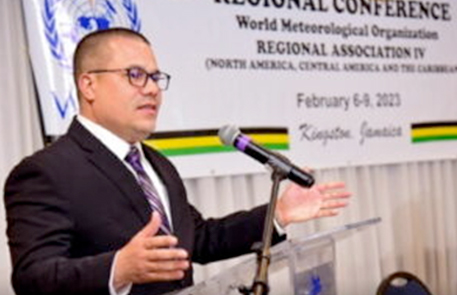Jamaica calls on World Meteorological Organization to Educate Global Communities about Climate Change
KINGSTON, Jamaica – Jamaica has called on the World Meteorological Organization (WMO) to take steps to ensure that populations across the world are educated about the link between climate change and slow and gradual weather events.
 Minister without Portfolio Matthew Samuda via CMC“This body has the credibility and credentials to ensure that the world also understands slow onset events, which [are] often overseen and understated… people don’t necessarily appreciate what is climate change and that climate change is present,” said Minister without Portfolio in the Ministry of Economic Growth and Job Creation, Matthew Samuda, as he addressed the WMO’s Regional Association IV conference on Tuesday.
Minister without Portfolio Matthew Samuda via CMC“This body has the credibility and credentials to ensure that the world also understands slow onset events, which [are] often overseen and understated… people don’t necessarily appreciate what is climate change and that climate change is present,” said Minister without Portfolio in the Ministry of Economic Growth and Job Creation, Matthew Samuda, as he addressed the WMO’s Regional Association IV conference on Tuesday.
Samuda said that sea-level rise “is a clear and present danger” for countries such as Jamaica, where 70 percent of the population live within five kilometers of the sea, noting also that climate change can also affect the protection of Jamaica’s cultural heritage.
“The risks to these sites are extreme. This includes our libraries, monuments, historic buildings, works of art, protected areas and, indeed, all the cultural resources. This, for countries like Jamaica, represents a shared wealth. The WMO has a tremendous role to play.
“As such, my call to you and to this body is that we do not leave out the impact of gradual weather changes in how we discuss the weather with the public,” Samuda said, as he welcomed delegates to the four day conference.
“I look forward to what, I am sure, will be critical discussions on the way forward in mitigating natural hazards and risks in the face of dangerous and continuous climate change while we learn to warn people earlier and better,” he added.
The WMO is a specialized agency of the United Nations responsible for promoting international cooperation on atmospheric science, climatology, hydrology and geophysics.
The Regional Association IV Conference is being held under the theme ‘Increasing Weather, Water and Climate Resilience in North America, Central America and the Caribbean’.
More than 60 participants from 20 member countries are attending the conference in-person, while others are participating via online platforms.
Several panel discussions are to take place during various sessions over the duration of the conference focusing on, among other things, challenges, opportunities, observations, and building collaborations.
Samuda told the conference that the Meteorological Service of Jamaica (Met Service) is improving its forecasting ability through the acquisition of essential technology.
He said that the investment, which also aims to keep citizens informed, includes the acquisition of several automatic weather stations and collaboration with academia for the development of data-transfer technology.
He said that the data-transfer system will allow the Met Service “to remotely retrieve and relay information about existing weather in real time to a monitoring platform within their offices and on mobile devices”.
Samuda also cited the acquisition of a Smart Alert web-based application that will “communicate multi-hazard warnings to all mobile phone users through a common alerting protocol using color-coded graphic messages”.
He said Jamaica is in the process of installing its doppler radar, which is expected to be completed this year.
He noted the government’s proactiveness in the development of a climate change data node, “which will improve the decision-making process… in relation to climate change.
“This data node will efficiently store, manage and provide access to climate-related data for all users, facilitating planning, efficient management of the island’s resources, and, indeed, promoting sustainable development,” Samuda explained.


